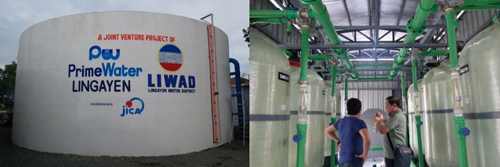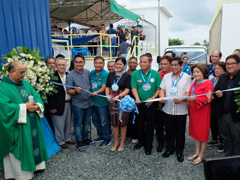- Home
- Countries & Regions
- Asia
- Philippines
- Press Release
- JICA-assisted water treatment rehabilitation project in Pangasinan seen to close water quality gap in rural areas
Press Release
August 1, 2019
JICA-assisted water treatment rehabilitation project in Pangasinan seen to close water quality gap in rural areas
The rehabilitation of a water treatment facility in Lingayen, Pangasinan could help close the gap in water quality in rural areas, according to the Japan International Cooperation Agency (JICA).
JICA's grant aid assistance to the Local Water Utilities Administration (LWUA) and seven water districts (Metro Roxas City (formerly Panitan), Pontevedra, Dingle-Pototan, Abuyog, Binmaley, Lingayen, and Pagsanjan) was given under the Project for Improvement of Water Quality in Local Areas program back in 2002 to 2005. This included the construction of a water treatment plant (WTP) to ensure the distribution of safe and clean water to the Filipinos in rural areas.
In 2013, Lingayen Water District (LIWAD) partnered with PrimeWater Lingayen, a private company, to address non-water revenue losses while also improving the overall process and maintenance of its pipeline network. The company also installed an additional ion filtration facility to reduce the color of the supplied water to residents.
 Unfiltered water storage (left); ion filtering tanks (right)
Unfiltered water storage (left); ion filtering tanks (right)
LIWAD is also a recipient of a follow-up cooperation project in 2017. This aims to rehabilitate and further improve the operations of the WTP in order to ensure the distribution of potable water to residents in the barangays of Lingayen.
PrimeWater Lingayen Branch Manager Archival Samson shared, "The rehabilitation really helped our operations because the machines that supply the water improved. We can better control and balance the input and output of water. So during rush hours, we can increase the water pressure in order to keep up with the high demand."
"We would like to help the Philippines improve its access to quality and reliable water sources through the project, and we laud the partnership of LIWAD and PrimeWater Lingayen to achieve that direction. Access to clean and safe water is a crucial element in improving the quality of lives of Filipinos, especially disadvantaged communities in rural areas," said JICA Philippines Senior Program Officer Kessy Reyes.
Since the rehabilitation, the WTP has served 4,000 households from 16 barangays, an improvement from the previous 2,500, for 24 hours every day.
LIWAD and PrimeWater Lingayen are studying the possibility of the nearby Agno River Bulk Water as a viable ground water source in order to accommodate more families and households in the future.
Water in rural areas, especially those from small-scale water supply service providers, contains substances such as iron, manganese, as well as color and odor that do not pass the Philippines' water quality standards. Based on the report of the Philippine Statistics Authority (PSA) Annual Poverty Indicators Survey 2017, almost four in every five families in rural areas do not practice any method or treatment in ensuring that their drinking water is safe.
A World Health Organization (WHO) report likewise showed that 1 in 10 people in the Philippines still do not have access to improved water sources. The same report showed that in 2016, one of the top 10 leading causes of death in the Philippines was water-related diseases such as acute diarrhea, claiming over 139,000 lives.
JICA has been addressing the Sustainable Development Goals (SDGs), which encourages increased investment in water systems and sanitation at the local level, particularly in developing countries. In the Philippines, JICA has been supporting water improvement related projects since the 1960s.
 At the inauguration ceremony of the newly rehabilitated water treatment plant
At the inauguration ceremony of the newly rehabilitated water treatment plant

- Asia
- Southeast Asia
- Cambodia
- Indonesia
- Laos
- Malaysia
- Myanmar
- Philippines
- Thailand
- Timor-Leste
- Viet Nam
- East Asia
- China
- Mongolia
- Central Asia and the Caucasus
- Armenia
- Azerbaijan
- Georgia
- Kyrgyz Republic
- Tajikistan
- Uzbekistan
- South Asia
- Afghanistan
- Bangladesh
- Bhutan
- India
- Maldives
- Nepal
- Pakistan
- Sri Lanka
- Oceania
- Latin America
- Africa
- Middle East
- Europe
- Asia
- About JICA
- News & Features
- Countries & Regions
- Our Work
- Thematic Issues
- Types of Assistance
- Partnerships with Other Development Partners
- Climate Change / Environmental and Social Considerations
- Evaluations
- Compliance and Anti-corruption
- Science and Technology Cooperation on Global Issues
- Research
- JICA Development Studies Program / JICA Chair
- Support for the Acceptance of Foreign HRs / Multicultural and Inclusive Community
- Publications
- Investor Relations
